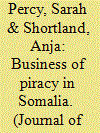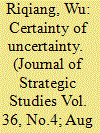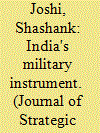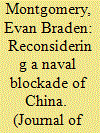|
|
|
Sort Order |
|
|
|
Items / Page
|
|
|
|
|
|
|
| Srl | Item |
| 1 |
ID:
122928


|
|
|
|
|
| Publication |
2013.
|
| Summary/Abstract |
This article argues that understanding why Somali piracy has resisted control efforts requires understanding that it is a criminal business rather than a conventional international security problem. We statistically model Somali piracy and draw two conclusions: first, piracy increases with economic stability, and second, naval interdiction efforts are stabilising but not significantly reducing piracy. We argue that these conclusions are not surprising if piracy is understood as an organised crime. Our argument has four components. First, Somali piracy is a land-based problem, and naval control mechanisms are not deterring pirates. Second, improving Somalia's anarchic political situation will not necessarily stop piracy: our statistical analysis demonstrates that piracy is a business which improves with a more stable operating environment. Third, piracy is organised criminal activity, and like other organised crime groups, will be difficult to control, especially if it becomes embedded in state structures. Finally, we argue that few of the relevant players have any real incentives to alter their behaviour.
|
|
|
|
|
|
|
|
|
|
|
|
|
|
|
|
| 2 |
ID:
122929


|
|
|
|
|
| Publication |
2013.
|
| Summary/Abstract |
China's nuclear deterrent relies on so-called 'first strike uncertainty', which means not letting the other side be confident of a completely successful disarming strike. But in order to deter, the uncertainty must be high enough. After reviewing the developmental history of China's nuclear capability and the evolution of Chinese and foreign leaders' perceptions of China's nuclear retaliatory capability, this article identifies the criteria of nuclear deterrence for China and other countries. This research can contribute to Sino-US strategic dialogue and deepening understanding of the security consequences of nuclear proliferation.
|
|
|
|
|
|
|
|
|
|
|
|
|
|
|
|
| 3 |
ID:
122926


|
|
|
|
|
| Publication |
2013.
|
| Summary/Abstract |
India has increasingly high aspirations in the Indian Ocean, as enunciated by politicians, naval figures and the wider elite. These aspirations, its strategic discourse, are of pre-eminence and leadership. India's maritime strategy for such a self-confessed diplomatic, constabulary and benign role is primarily naval-focused; a sixfold strategy of increasing its naval spending, strengthening its infrastructure, increasing its naval capabilities, active maritime diplomacy, exercising in the Indian Ocean and keeping open the choke points. Through such strategy, and soft balancing with the United States, India hopes to secure its own position against a perceived growing Chinese challenge in the Indian Ocean.
|
|
|
|
|
|
|
|
|
|
|
|
|
|
|
|
| 4 |
ID:
122927


|
|
|
|
|
| Publication |
2013.
|
| Summary/Abstract |
For six years, India has sought to implement an army doctrine for limited war, 'Cold Start', intended to enable a Cold War era force optimised for massive offensives to operate under the nuclear threshold. This article asks whether that is presently feasible, and answers in the negative. Doctrinal change has floundered on five sets of obstacles, many of which are politically rooted and deep-seated, thereby leaving the Army unprepared to respond to challenges in the manner envisioned by the doctrine's architects.
|
|
|
|
|
|
|
|
|
|
|
|
|
|
|
|
| 5 |
ID:
122930


|
|
|
|
|
| Publication |
2013.
|
| Summary/Abstract |
Sean Mirski's assessment of a naval blockade is an important contribution to the debate over how the United States should respond to China's growing military power. Nevertheless, it has three limitations. First, although distant and close-in blockades could be employed in tandem, analyzing them separately helps to explain when they might be used and how they could influence escalation. Second, while conventional countervalue and counterforce options could also be employed together, this would depend on the degree to which they overlapped and the order in which they were implemented. Third, a blockade could lead to unanticipated prewar, intra-war, and postwar challenges.
|
|
|
|
|
|
|
|
|
|
|
|
|
|
|
|
|
|
|
|
|